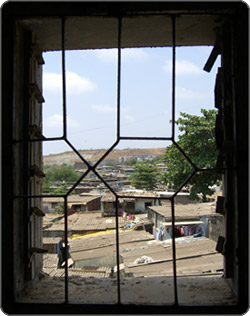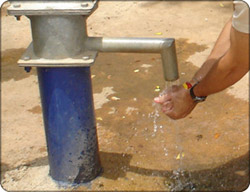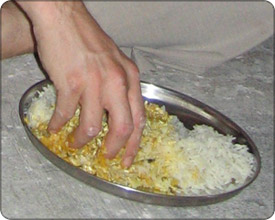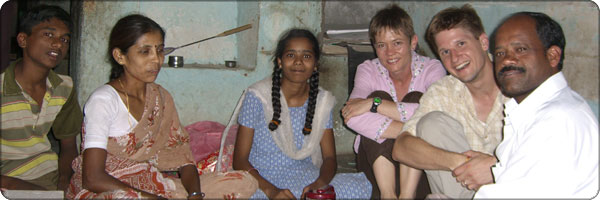Part 3 of a three part series on how to use homestays to jump-start a community-based entrepreneurial initiative. Also check out Part 1 and Part 2.

A window into the community
May 6th, 2006, the third day of my homestay in the Sri Lanka colony of the Indiramma Nagar slum cluster, next to the airport in Hyderabad, India. The mercury was pushing 46 degrees Celsius. No hint of the coming monsoon.
"Soja," my host Sultana ordered me. I didn't argue, the combination of the Indian summer and all the rice and spice I had just eaten made taking a nap look like the most sensible option. A well-intentioned ceiling fan was forcing hot air down onto me, evaporating the sweat below my skin and drying out the insides of my nose. I felt like I was drinking gallons of water yet never had to go to the bathroom.
Before starting my homestay with Sheik Baba and Sultana, I had a host of plans to learn local skills and reach out to people in the slums, but the sheer heat of the day had made me scale back my aspirations. I was still managing to get out and meet people in the community, but had to retreat to shadier spots whenever the sun was high in the sky, which was often. Making friends while doing something active like hauling trash, as I had in Nairobi, didn't seem like much of an option here.
In the meanwhile, my attempts to help out around the house had met with mixed success. For example, when the local taps turned on in the morning I had gone out to help Sultana haul water, but I almost botched the job when some joking neighbors tried to get me to pour the water down a sewage trench instead of into the family's water tank. Still my presence seemed to have bumped up Sultana's position in the subtle hierarchy around the public water taps, so maybe I was helping after all.
I lay down to rest as the kids settled in to watch a show on the family's TV: the electricity could be fickle, but they had access to lots of channels. In an hour my new friend Muneer was coming around to introduce me to someone who ran a small ice cream business, and then later we were going to his cousin's wedding. Along the way we would stop and visit some more local businesses and meet some of the rickshaw drivers.
Things hadn't turned out exactly like I had expected, but I guess that was to be expected too...
Considerations during a homestay
During a homestay, it's important to be flexible and roll with the circumstances, as you can never fully predict what might come up. Still, there are a number of practicalities to consider during your time as a guest in the community. Several important ones are listed below, though not all apply to every culture and region:

Keeping cool at the local water tap
- Drinking: We sometimes drank the local water on homestays, sometimes didn't, sometimes got sick, sometimes didn't. Some communities will have shops that sell bottled water, but don't count on it. It's a good idea to bring medication with you to deal with troubled stomaches, either mild (Zantac, etc.) or strong (Citpro). And as collecting water is often at the center of many community members daily activities (especially for women), helping to get water for the day is a great relationship building activity and opportunity for observation.
- Eating: you can let your hosts know of any dietary restrictions but it's best to try and eat what your hosts eat. Hosts may want to cook special meals for you but try to explain that you are trying to experience local life as they live it. However, offering to treat your hosts to a special meal (either cooked at home or at a favorite restaurant) towards the end of your homestay can be a great bonding experience, as well as a way to each share about aspirations (food ones, any ways).
- Toilets: squat toilets (either pit latrines or toilets without running water) are the norm in many parts of the world. Some are communal (outside of the home) and some are private (inside the home). You can bring toilet paper and hand sanitizer, but your hosts will probably be as or more aware of sanitation issues as you are. Just remember that in lots of countries only your left hand is used for certain, ah… clean up tasks, and that hand shouldn't be used for much else. Or as my friend Muneer reminded me one day, “Patrick, we don't do good things with our bad hand.”
- Baths: bathing schedules vary in different parts of the world and even among different groups. For example, in Kenya, I got a chance to bathe every day, but my colleague Erik had less chances, mostly based around the schedule of our hosts. Bucket bathing (pouring water over your head) may be the most common form of bathing in some communities. In some parts of the world, the custom may be to wear a layer of underclothing while bathing.
- Communicating: if you don't speak the local language, learning at least the common greetings and key words can go a long way. You can find someone in the community to help you communicate, but drawings, pantomiming, and learning a few new phrases are probably the best way to go. Language learning during your homestay becomes a great way to reverse roles with both children and adults, and your mistakes become a great opportunity to laugh at yourself and break through tensions.
- Sharing expenses: introducing money into a homestay upfront (i.e. paying as if you were a hotel guest) generally impacts the experience in a negative way. However you also don't want to be a burden on your hosts, so whenever you can offer to pay for groceries, bus fare, drinks, etc. There are a lot of etiquette codes for hosts and guests to be wary of in almost any country, so sometimes you have to discover the tactful way for offer to help out.
Get active
Despite its name, a homestay isn't just about staying inside a home. Below are some example activities that team members can do during a homestay. Try to follow your hosts' lead rather than initiating activities on your own. Offering to help someone that is painting a fence, for example, is very different than offering to paint someone's fence.

Learn to eat all over again
- Learn a skill: try to learn something that your hosts know how to do well. Demonstrating a humble desire to spend time in, learn from and work with a community during homestay was critical to setting the right tone for our past projects.
- Demonstrate a skill: if it doesn't distance you or put you “above” your hosts, try teaching an activity, especially to kids. Helping children do their homework, practice a sport, cook a meal, create origami, draw, etc. can help to build rapport.
- Help out around the house: whatever chores or activities the family needs, try to help out around the home. Hosts may feel embarrassed by a guest helping them with their daily chores, and guests should refrain from creating additional burdens through their zeal to be involved, but try your best to be helpful. Doing your own laundry in some parts of the world can be quite the attention getter, not to mention a good opportunity for humor.
- In the kitchen: some cultures place a strong taboo against guests (or men) in the kitchen. Still, if encouraged, offer to spend some time helping out in the kitchen. Some of the best family conversation happens over a stove or cutting board.
- Share stories about yourself: especially about your own family. A photo album makes a great conversation tool, not just for your hosts, but for their neighbors too. Again, be careful of stories that demonstrate your superiority, create distance between yourself and your hosts, etc.
- Play: taking the time to play games with kids, or to play sports in the neighborhood, is another great way to build rapport, not to mention to relax and smile. A playful mind also helps you keep from taking yourself too seriously.
- Attend local events: hopefully through your homestay, you'll be invited to attend local events, parties, church, weddings, volunteer activities, etc. Look to your hosts for guidance about how to best be involved, and if asked talk about why you're there: “we're starting a new project in the community, and the Smiths are showing me around and helping me get to know the community.”
- Learn your way around the neighborhood: in some communities, the layouts of roads and trails can seem pretty haphazard. Learning how to orient yourself and reach key landmarks within the community can you help move around on your own and thus be less of a burden on your hosts. Knowing your way out of a community (especially an urban slum) can also help in the rare event of an emergency.
- Just be there: one of the powers of a homestay is that it forces team members to slow down and stop pushing an agenda. There's tremendous power in spending time responding to other people's activities and needs, rather than trying to push your own, nor matter how well intentioned. And as one team member put it, “it's impossible to be mechanical during a homestay.”
After a homestay
Finally, the follow-up to a homestay can be as critical as the homestay itself. Below are some important activities to think through for after a homestay:
- Thank your hosts: a simple, but important step, thank your hosts for their hospitality, and let them know what activities and events will be coming up in the project. Try to invite your hosts to future social events too, or even your own project office or home, if nearby. And of course, as much as possible, try to involve your host in your project activities.
- Debrief your visit: if possible, bring together your local partner and your homestay hosts (and potentially the whole team) to discuss your experience living together. Talk about some of the activities you did together, and if it's comfortable, talk about some of the misunderstandings you may have worked through. Funny stories are particularly welcome.
- Reference your homestay: mentioning your homestay, that you spent a little bit of time as a guest of a family in the community, can help to open up some doors, but it is important do so in a humble way. Be wary of sounding like your short time there has provided you with deep understanding about people in the community; on the other hand, describing how a homestay provided you insights about yourself or your organization is another matter.
- Bring a gift: express your appreciation and bring a gift for the family (or kids). Do your best to make it something personal: for example, in India, I noticed how often Baba and Sultana's kids liked to scribble in my notepad, so I offered them a gift of crayons and coloring books. Much family coloring ensued.
- Visit: even if members of the family end up working with the team in the later phases of a project, make sure to stop by your host family on a regular basis, just to socialize and to let them know how the project is going (if they're not already involved).
- Take pictures: a camera can create the impression that you're studying someone, so you may want to limit your picture taking until after the homestay. If you do want to use your camera during your stay, try taking pictures of what your hosts would like photos of, or do what my colleague Erik did and just lend your camera to your hosts for a week. A framed photo of you and your hosts can also make a great gift.
- Write a story: even if you're not much of a story-teller, try writing a story about your homestay that you can share with project partners and your hosts. The act of writing helps you identify connections and themes you may not have pulled together before.
 All smiles: Erik and his wife Jo return to visit his homestay family
All smiles: Erik and his wife Jo return to visit his homestay familyGuests, like fish, begin to smell after three days...
Ultimately, you get out of a homestay what you put it into. If you are uncomfortable and closed off, even unintentionally, you will likely find that your hosts are closed off to you too. But be patient, it takes times to get used to new people and to a new place.
People on homestays have often expressed a transformation that occurs around the third or fourth day of a weeklong homestay… paradoxically just after the point where you're supposed to start smelling like fish. After three or four days, both homestay hosts and guests often become more familiar with one another and unconscious barriers are lowered, to the point where even language problems seem less painful.
On the fourth day of my homestay with Baba and Sultana, I became suddenly aware of a tension I had been carrying around with me since I arrived. So during morning tea, I consciously worked to relax and open up, and I was amazed out how much more everyone seemed to open up to me. As my smile grew bigger, their smiles grew even bigger still. It was magical.
So don't forget to smile. You won't smell so bad.

 A window into the community
A window into the community Keeping cool at the local water tap
Keeping cool at the local water tap Learn to eat all over again
Learn to eat all over again